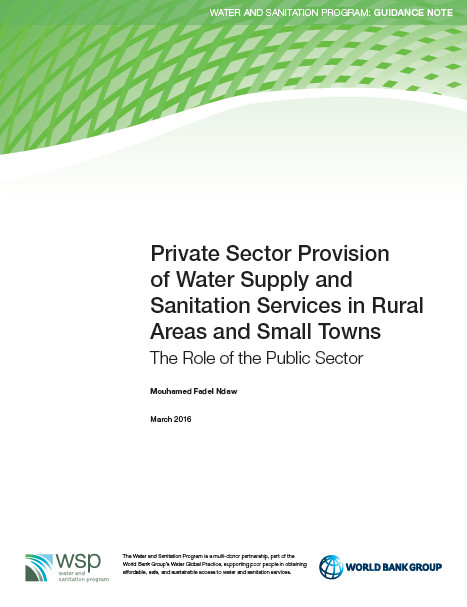Private Sector Provision of Water Supply and Sanitation Services in Rural Areas and Small Towns : The Role of the Public Sector
 |
rapport Mar 2016 ; 62 pages
Aut. Mouhamed Fadel Ndaw
Ed. World Bank - Washington
Téléchargeable sous format: PdF
Téléchargeable chez l'éditeur
Page de présentation d'un éditeur
Abstract:
Many developing countries are about to prepare their new strategies on how to achieve the Sustainable Development Goals (SDGs) for universal and equitable access to water and sanitation by 2030.These new roadmaps need to put a focus on rural growth centers and small towns where the majority of those without access to water and sanitation reside. In 2015, a third of the global rural population was living within the service area of a small piped water scheme mainly operated by water users association. These schemes are generally ill-maintained and ill-managed. Recent experiences in seven developing countries (Bangladesh, Cambodia, Colombia, Niger, the Philippines, Senegal, and Uganda) have shown that domestic private sector participation (DPSP) is an effective and proven approach to address challenges in small towns’ water and sanitation services delivery.
The report aims at helping national and local governments in developing countries and water professionals to better engage with the domestic private sector in the provision of sustainable water and sanitation services in rural growth areas and small towns. Contents:
I. Introduction
II. Why Small Towns Are Important
III. Water Supply and Sanitation Challenges in Small Towns
IV. Potential for Private Sector Involvement
V. The Public Sector’s Role in Enabling Private Sector Participation
VI. Lessons Learned from the Case Studies
VII. Support to Public Institutions
VIII. Support to Private Institutions
Appendix A: Capacity and Readiness Assessment
Appendix B: Key Reference Sources
Mots clefs: |
marchandisation, privatisation (CI) (DT) (OP) (ope) , rural (CI) (DT) (OP) (ope) |
Editeur/Diffuseur: |
|
World Bank - Washington - Etats Unis |
En cas de lien brisé, nous le mentionner à communication@pseau.org